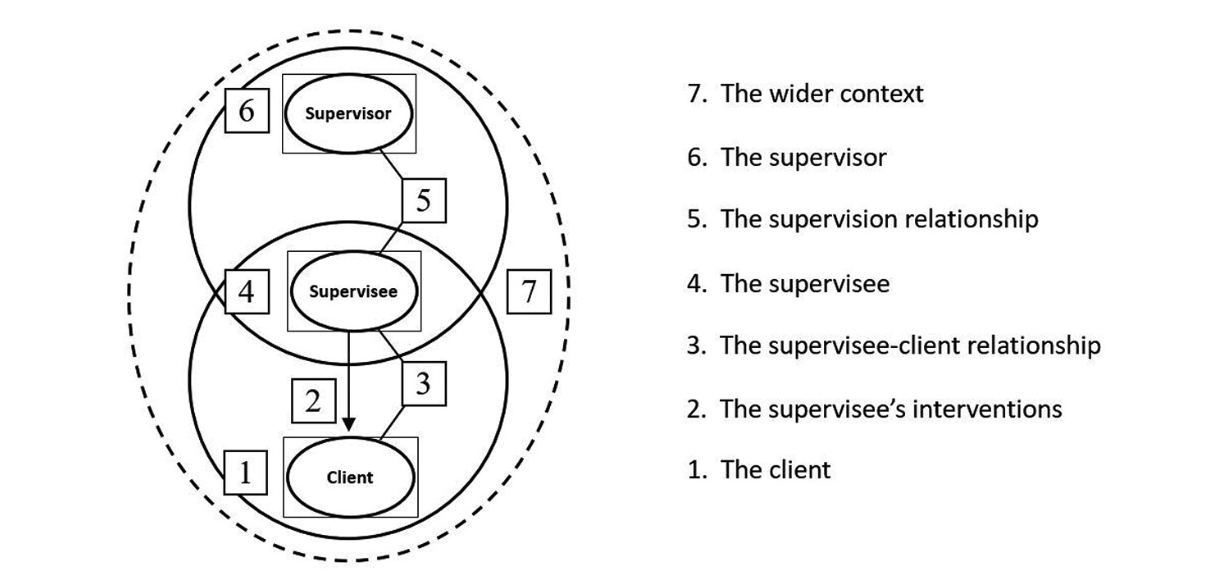Supervision
A key support structure for every therapist.
Good supervision keeps us connected to why we chose this profession in the first place. With the support of a supervisor, we become better therapists, grow internal capacity for additional clients and find our caseload easier to bear. Supervision is an important part of self-care and helps reduce work stress or burnout.
My approach is based on the seven-eyed model of supervision. This model was first developed by Peter Hawkins in 1985 and has been developed further by Peter and colleagues over the last 40 years.
This provides a strong framework for an exploration of every level of your work. Within this multi-faceted structure, each supervisory dyad is unique. We draw on my own experience as an integrative psychotherapist - and yours. The value of supervision is derived from what we create together from our joint pool of knowledge and experience.

The Seven-Eyed model of supervision
Peter Hawkins and Aisling McMahon: (2020) Supervision in the Helping Professions 5th Edition McGraw-Hill.
Trained in humanistic psychotherapy, I later studied psychoanalytic, psychodynamic, attachment, trauma and dissociation models of thinking about how the mind works.
I am mindful of the impact of the brain’s method of processing on what can be thought about. Neurodiversity, PTSD and dissociation all influence how a client will respond.
In addition, foundation courses at the Institute of Group Analysis and the Institute for Family Therapy have helped me to consider the individual and couple within the wider context of their lives, my role is to support you and your on-going practice, with respect for your previous work, existing understanding and life experience. With trainees and new therapists, this can involve a teaching and mentoring perspective. With more experienced therapists, the dialogue is more collegiate with an exchange of views about your work. When difficulties arise, we can think through these together.
As a psychotherapist in private practice for thirty-five years, my in-depth experience has left me curious about the work we do. Exploring the counter transference in ‘stuck’ places can illuminate why a client stalls in life. I am genuinely interested in every client that you bring and every response and reaction within your work – not just the ‘good’ ones.
Everything you think and feel about your work has a place and a value.
Supervision for Family lawyers
Couples frequently do not have the emotional, psychological or financial resources needed to do endings well. Arguments about custody of the children or financial arrangements can tear apart any resolutions of civility and fairness.
Family lawyers and mediators have to pick up the pieces.
Even though your focus is on the legal process, working with families and couples inevitably has an emotional cost. The workload of distressed clients that you have to hold in mind, while
concentrating on delivering accurate, timely and sometimes demanding legal work can feel relentless.
Supervision for family lawyers offers a dedicated, confidential, secure partnership to explore how your work is impacting you and what you need for self-care. There are only so many emotional experiences that we can store before they start to slow down our thinking. This can have a long term impact on health. It can create stress and burnout. Supervision can help to maintain your long-term health and the sustainability of your career.
I am a member of the Association of Family Law Supervisors (AFLS). I trained as a general supervisor at the Centre for Supervision Training and Development (CSTD Bath). I trained additionally to supervise family lawyers through the FLiP Faculty.

Get in touch
Please feel free to contact me via the contact form or directly by email at lynneholmes@icloud.com if you have any questions or would like to arrange an initial appointment.